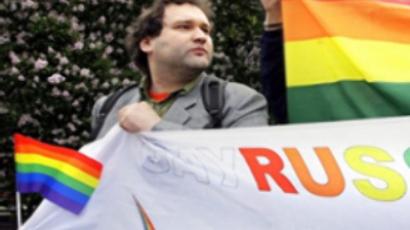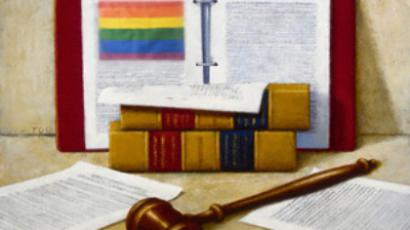Police disperse gay pride parade
The latest attempt to hold a gay rights march in Moscow was over before it began. Police broke up a crowd preparing to protest, arresting at least 24 activists, including the event’s organizers.
The activists had gathered in front of Moscow State University in the south-west of the city. As they began chanting slogans such as: "Equal rights, no compromise!", "We want the right for same-sex marriage!" and "We want a law against discrimination!" – Omon riot police moved in and made the arrests.
In just a few minutes the police had detained the entire group, including one of the organizers. They were put on buses before being driven away.
Moscow authorities banned the march saying they couldn’t guarantee the event’s security, and were unlikely to have a last-minute change of heart.
As in previous years, they had warned the parade's organizers in advance.
Unsanctioned gay parades have provoked clashes with anti-gay organizations in the past. Last year violence broke out at a march which attracted ultra nationalists opposed to it. The authorities were determined not to see a repeat of such scenes this year.
But Saturday’s march went ahead regardless, timed to coincide with the final of the Eurovision song contest to get as much publicity as possible. The contest has always had a big gay following.
One gay couple even dressed as newlyweds for the occasion, but failed to avoid arrest.
Mayor says never to "satanic" marches
Moscow's Mayor Yury Luzhkov has described gay parades as "satanic" and vowed never to allow them in the city. Nevertheless, unsanctioned events still took place, provoking clashes with police and anti-gay organizations.
The latter, including nationalists and religious groups, were permitted to hold their rally against the parade – and hundreds showed up, so the threat of violence was quite real.
Fighting broke out at last year's parade which attracted ultra-nationalist organizations opposed to gay rights, with Right Said Fred singer Richard Fairbrass was among those who suffered injuries.
“We are not against homosexuals, we are against the propaganda of sin. We believe gay parades are some kind of spiritual terrorism. Look at this year – they've picked the date of the final of Eurovision not by chance, but to provoke clashes in the streets,” Mikhail Nalimov from the Orthodox Youth of Russia movement said.
Gay activists say violence is never the objective – they simply want to peacefully attract attention to the issue of gay rights in the country.
A fight for gay rights or a farce?
The taboo on gay/lesbian subjects dates back to Soviet times when homosexuality was banned, and was considered a crime punishable by jail in Russia until 1993. Gay rights activists say even now they still have to fight to be accepted in society.
Part of the way they're trying to achieve equal rights is through the annual parade. But in the past three years the Moscow city authorities have cited "safety concerns" when refusing to license the rally.
“This is just one of the examples of how the rights of sexual minorities are being ignored in the country. It's not about public demonstrations. It’s about the recognition of the private rights of citizens. A lot of things have to be changed; that’s what we are trying to achieve,” gay activist Nikolay Alekseev told RT prior to the attempted parade.
For years Alekseev, who heads GayRussia, has been on a self-proclaimed crusade to establish gay rights.
However, some members of Russia’s considerably big gay community have accused Alekseev and other activists working with him of serving their own interests. According to them Alekseev parasites on Russian and European grant money, by igniting the conflict around the gay rights in Russia.
According to them, Alekseev travels around Europe telling horrifying stories about the state of gay rights in Russia, convincing EU gays to donate money to aid their Russian counterparts. Back at home it has been alleged he pays ultra-nationalists money to organize protests against gays. This is rumored to bring Alekseev an estimated $200,000 a year.
Alekseev is also accused of bullying key members of Russia’s gay community, who speak out against the gay pride parade in Moscow, like gay.ru website founder Eduard Mishin or popular singer Boris Moiseev. Similarly GayRussia is said to bully the freshly spawned gay activist organizations.
Lesbian union cancelled
Earlier in the week, on May 12, a lesbian couple attempted to have the first-ever gay marriage in Russia.
Irina Fedotova and her girlfriend Irina Shipitko booked their appointment for Tuesday, paid the fee, picked up their bridal bouquets and arrived at the Registry Office in the center of Moscow. Only there did they find out that same sex couples can’t get married in Russia.
For them registering their marriage was not just a sudden desire for unity but a way to obtain the same rights as all married couples in Russia. Now they plan to take their dream to Canada, where same-sex couples do not need to be resident to tie the knot.
“We've been together for a long time, we are not different from any other couple, we want to get married officially – why can’t we do that?” Irina Shipitko said.
The story of a lesbian couple trying to marry is still remarkably news-worthy in Moscow. Despite there being a sizeable gay community in the capital, same-sex marriage remains a taboo subject.
St. Pete’s gays prefer flash mob
And gay rights activists in St. Petersburg chose a more creative way than gay pride parades to get their message across.
Over 100 people took part in a ‘Rainbow flash mob’ which involved walking down Nevsky Boulevard (St. Petersburg’s main street) carrying balloons and wearing rainbow-coloured clothes.
The group passed out flyers urging acceptance of the gay community.
“We are no longer going to pretend that we do not exist,” organizers said.
Police maintained a presence but no arrests were made as no city laws were broken.














